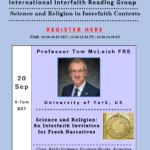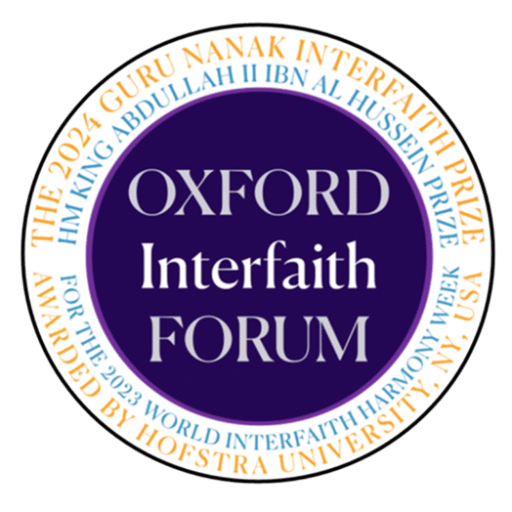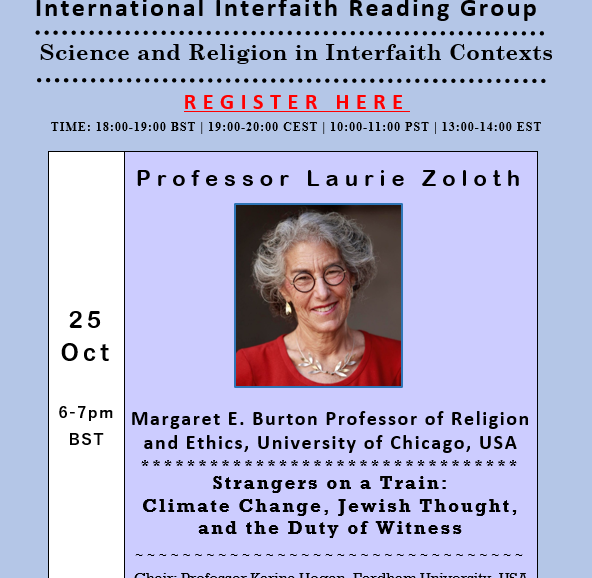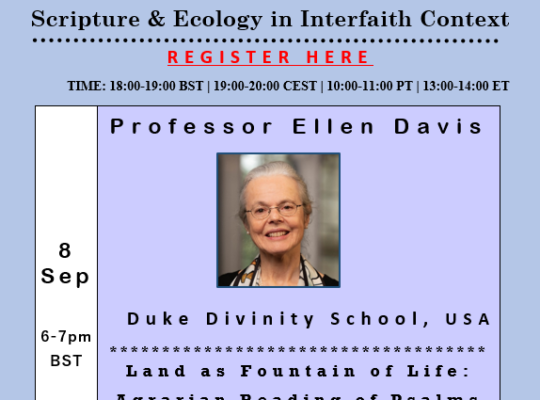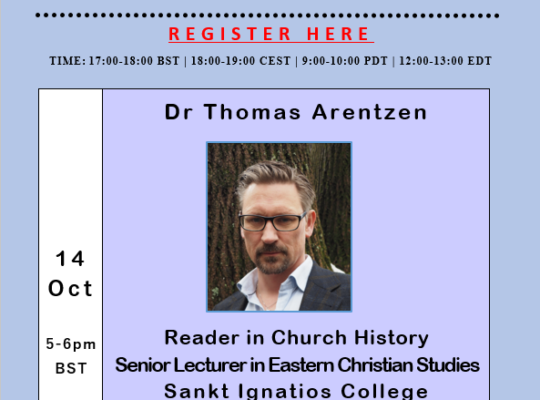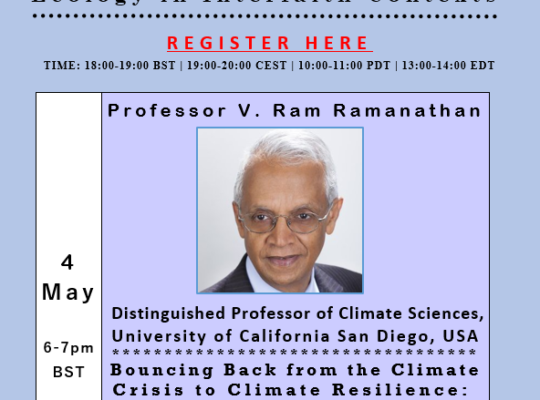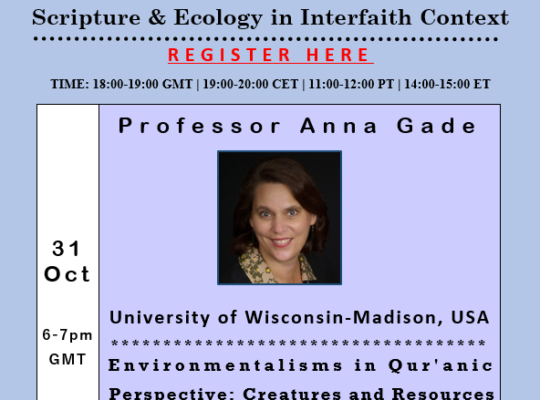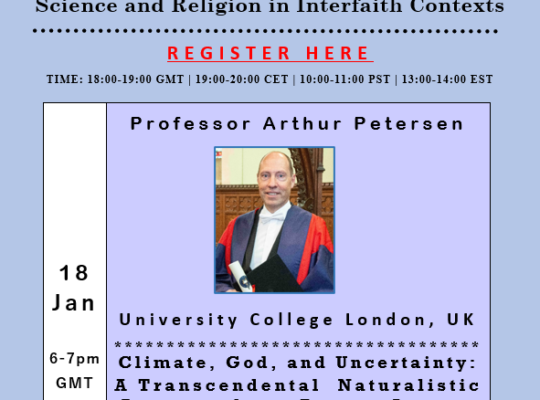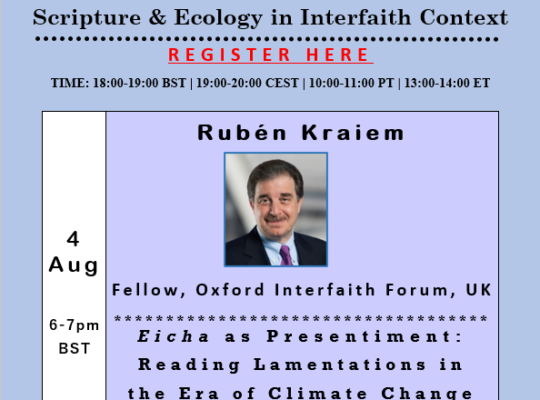25 October, 2022
We are deeply honoured to welcome Professor Laurie Zoloth, Margaret E. Burton Professor of Religion and Ethics, and Senior Advisor to the Provost for Programs in Social Ethics at the University of Chicago, USA, to lead a session of the International Interfaith Reading Group on Science and Region in Interfaith Contexts.
Here are the details of this fascinating event.
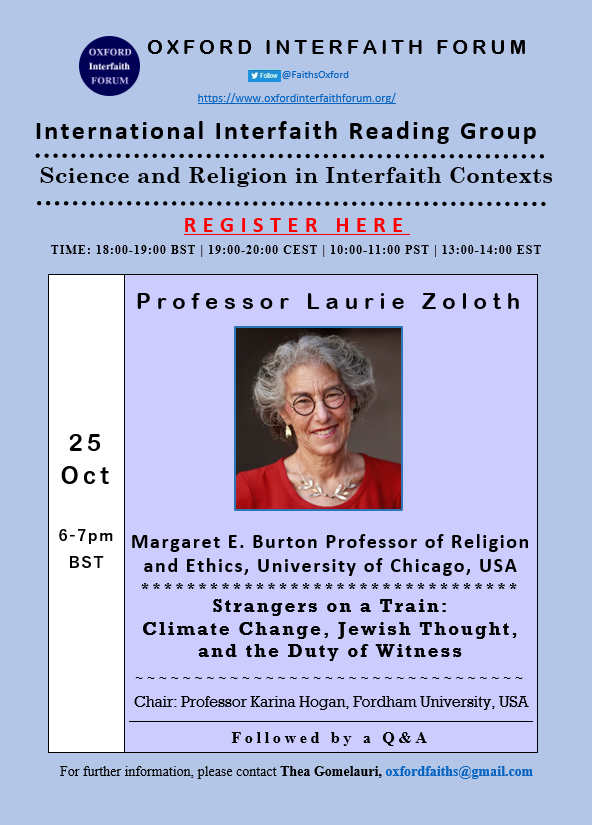
Topic: Strangers on a Train: Climate Change, Jewish Thought, and the Duty of Witness
Abstract: This talk takes as on one of the central ethical questions of our time: climate change, and proposes a way to think, that considers both the scientific facticity of our situation and the moral and theological imperative to act. One of the problems with a changing climate is this: we cannot see the faces of the people who will be first affected, and most affected. In a forthcoming book, An Ethics for the Coming Storm, (Oxford, 2023) I detail the situation in which every city, at the margins of every place, town, village, and the spaces between, there will be actual people who are violently killed by the violence that is global warming. In the chapter that I am presenting in this talk, I return to a narrative from Deuteronomy 21, about the event of a unwitnessed death in the empty land between two cities, about the death of the destitute and unknown, and the texts in the Mishnah, Sotah 9, that considers the problem of guilt without assailants. I then suggest a way to think about the problem of global warming using the logic of the complex Biblical and Mishnaic texts. These narratives allow important discussions about the difficulty of judgement when we consider the problem of responsibility for acts for which one is not directly responsible, in which one is more than a bystander, but not a perpetrator. In these texts, the whole of the people needs to sacrifice to expatiate the blood of the abandoned one; in our time, we all, who are not the bad guys, who have not made the vast profits, or ordered the rain forest plowed to rubble, who don’t pass laws to allow extraction, but we are, we Westerners, we are those who participate in the not-seeing of the outcome of the action that we do need to consider what our duty of witness might entail. Most of us are not the actual perpetrators in the global warming story, for they are international energy extraction companies that make huge profits off of the catastrophe and oviscape and obscure the facts about the effects of their business. But here I want to think about the complexities of responsibility that we indeed bear. Emmanuel Levinas compares our situation to manslaughterers who all “live in the cities of refuge” because our casual purchases, our casual consumptions, our casual use of the world leads, inadvertently but inevitably, ends up leading to a series of events that leads to the death of others. This narrative of the Talmud pushes us further—even our inaction, our inability to see, our avoiding the eye of the homeless, hungry man as we rush about the city—needs to be expiated. Our little acts are little, to be sure, even trivial, but they are part of world that turns away the poor and does not see their deaths. For an ethicist, the moral problem of being, the question, as Levinas asks repeatedly: “is it righteous to be?” when being itself always consumes the world, bit by little bit, always more for me, less for the Other.
Speaker: Professor Laurie Zoloth, Margaret E. Burton Professor of Religion and Ethics and Senior Advisor to the Provost for Programs in Social Ethics at the University of Chicago, USA.
Speaker’s biography: A leader in the field of religious studies with particular scholarly interest in bioethics and Jewish studies, Laurie Zoloth’s research explores religion and ethics, drawing from sources ranging from Biblical and Talmudic texts to postmodern Jewish philosophy, including the writings of Emmanuel Levinas, Hannah Arendt, and Margaret Susman. Her scholarship spans the ethics of genetic engineering, gene drives, stem cell research, synthetic biology, social justice in health care, and how science and medicine are taught. She also researches the practices of interreligious dialogue, exploring how religion plays a role in public discussion and policy.
Zoloth is author of four books: Health Care and the Ethics of Encounter: A Jewish Discussion of Social Justice; Second Text and Second Opinions: Essays on Jewish Bioethics ; An Ethics for the Coming Storm: Jewish Thought and Global Warming; and May We Make the World?: Gene Drives, Malaria, and the Future of Nature, and co-editor of six books, includingNotes from a Narrow Ridge: Religion and Bioethics ; The Ethics of Error: Mistakes in Bioethics and in Medicine; and Jews and Genes: The Genetic Future in Contemporary Jewish Thought.
Zoloth has been the president of both the American Academy of Religion and the American Society for Bioethics and Humanities and Vice-President of the Society for Jewish Ethics. She was the director of the Jewish Studies program at San Francisco State University and director of graduate studies in religious studies at Northwestern. She is an elected member of the Hastings Center and a life member of Clare Hall, University of Cambridge. She was a founding board member of the Society for Scriptural Reasoning, the International Society of Stem Cell Research and the American Society for Bioethics and Humanities.
Her work on bioethics and health care led her to serve on the NASA Advisory Council, the space agency’s highest civilian advisory board; the International Planetary Protection Committee; the National Recombinant DNA Advisory Board, and the executive committee of the International Society for Stem Cell Research. She served as chair of the first bioethics advisory board at the Howard Hughes Medical Research Institute and has testified in front of Congress, the President’s Commission on Bioethics, and state legislatures.
Zoloth began her career as a neonatal nurse working in impoverished communities; she holds a bachelor’s degree in history and women’s studies from the University of California, Berkeley and a bachelor’s degree in nursing from the University of the State of New York. She received a master’s degree in Jewish studies and a doctorate in social ethics from the Graduate Theological Union. Zoloth also holds a master’s degree in English from San Francisco State University.
Prior to joining the University of Chicago, Zoloth served as a Charles McCormick Deering Professor of Teaching Excellence at Northwestern University, holding appointments in the Department of Religious Studies in the Weinberg College of Arts and Sciences and in the Feinberg School of Medicine. At Northwestern, she was founding director of the Brady Program in Ethics and Civic Life at the Weinberg College of Arts and Sciences and founding director of the Center for Bioethics, Science and Society at the Feinberg School of Medicine.
She currently serves on the national Ethics Advisory Board of NASA; and the national steering committee of The Engineering Biology Research Consortium, She has served as the dean of the Divinity School and as the Senior Advisory to the Provost on Social Ethics at the University of Chicago.
Chair: Professor Karina Hogan, Fordham University, USA.
Time: 18:00-19:00 BST | 19:00-20:00 CEST | 10:00-11:00 PST | 12:00-13:00 CST | 13:00-14:00 EST
Venue: Online
After registering, you will receive a zoom email containing information about joining the meeting. If you do not see the zoom email in your inbox, please, check your spam folder.
If you would like to join the Science and Religion in Interfaith Contexts Reading Group, please sign up here.
Related Sessions
- Animal Suffering in Evolution: A Spectrum of Christian Approaches
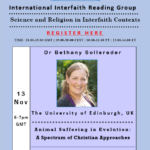
- Awakened Brain: Science of Spirituality and Human Flourishing
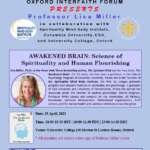
- Science-Engaged Theology in Judaism: Historical Overview
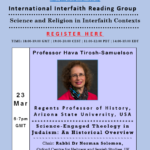
- Can Nature be ‘Red in tooth and Claw’ in the Thought of Augustine?
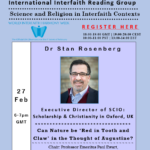
- The Awakened Brain: The New Science of Spirituality and Our Quest for an Inspired Life
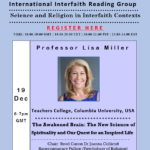
- Speaking Specifically in a Multireligious Conversation with Science
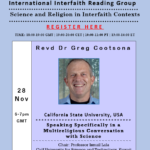
- Reflections on Science & Religion: Contradictory or Complementary?
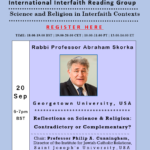
- 🕯️Science and Religion: An Interfaith Invitation for Fresh Narratives
